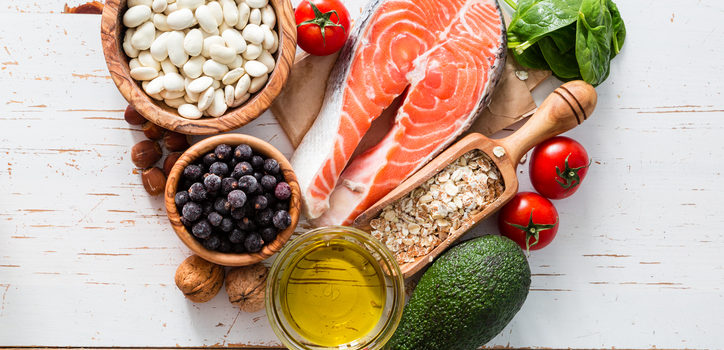You know the saying “you are what you eat.” These 10 simple steps can make a big difference in your heart health.
- Switch your dairy. First change to one percent and then to skim, or try almond milk or rice milk for a nondairy alternative. Use low-fat or nonfat sour cream, yogurt, cream cheese and ice cream.
- Choose lean cuts. Beef tenderloin, sirloin, eye of round, ground beef with 10 percent or less fat and pork tenderloin are good choices. Other alternatives include white meat chicken or turkey. Always remove the skin before cooking any poultry.
- Cook with monounsaturated or polyunsaturated oils. Use olive, canola, peanut, safflower, sunflower, sesame and soybean oils.
- Use more plant-based proteins instead of animal products. Black beans, kidney beans, pinto beans, chickpeas, lentils, tofu and soy are good sources of protein. Try veggie burgers (soy-based or grain-based) for an alternative to beef.
- Boost your intake of foods that are high in soluble fiber. Fiber binds to cholesterol in the digestive tract and helps remove it from your body. Good sources include oatmeal, oatmeal bread, oat bran cereal, beans and peas, apples, bananas and citrus fruits.
- Increase whole grains in your diet. Choose bread with at least 3 grams of dietary fiber per slice, whole-grain pastas and brown rice.
- Use products containing plant sterol and stanol esters. These components help keep your body from absorbing cholesterol. Consuming 2-3 grams a day decreases “bad” LDL cholesterol by 6-15 percent. Food products with added cholesterol-lowering sterols and stanols include margarines, orange juice and yogurt.
- Eat fatty fish twice per week. Choose wild salmon over farm-raised to reduce possible toxin exposure. Pregnant or nursing women and children should limit tuna intake to 6 ounces a week and avoid swordfish due to concerns about methyl mercury levels.
- Increase the amounts of fruits and vegetables you eat. Most women should have 1-1/2 cups of fruit and 2 to 2-1/2 cups of vegetables every day. Adding more of these to your diet fills you up, adds fiber and important nutrients and helps replace foods with saturated fats.
- Keep an eye on dietary cholesterol. Dietary cholesterol, which is found in eggs, dairy products and some other foods, may raise cholesterol in the blood slightly, but is unlikely to substantially increase risk of coronary heart disease or stroke among healthy men and women. If you have existing health conditions or risk factors for heart disease, such as diabetes, kidney disease, being overweight, smoking or having a family history of heart disease, you may need to monitor dietary cholesterol. Egg yolks are filled with dietary cholesterol – 213 milligrams in each. If you have elevated cholesterol, the National Cholesterol Education Program recommends your consumption under 200 milligrams per day. Egg whites are cholesterol-free, so use two for each whole egg in recipes, or use cholesterol-free egg substitute, which works well in baking and omelettes.
Mark your calendars!
- Know Your Numbers for Heart Health: February 16, Noon-1 PM
- Join us for lunch to learn how to reduce your risk for heart disease, tests you should undergo and small changes to make to take control of your heart health.
- Heart Attacks in Women: February 21, 6 PM-7 PM
- Learn symptoms and risks unique to women.

